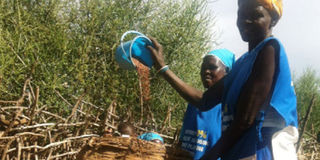Granaries feeding Karamoja women, giving them income

Ms Veronica Marouk demonstrating how she uses her granary to store food. PHOTO BY JALIRA NAMYALO
What you need to know:
Jalira Namyalo explores how women in Karamoja sub-region have embraced the use of granaries to better their incomes and also have food security in their homes.
Women in Karamoja sub-region face malnutrition and death of children coupled with gender-based violence while their husbands are away keeping cattle.
Low education levels in the area and poor health standards greatly affect the people of Karamoja, making the arid area of the country harsh to live in.
Until five years ago, Ms Veronica Marouk could not afford to meet the financial obligations of her family due to lack of income. Just like most of other rural women, Ms Marouk was only growing food for home consumption.
“I had difficulties to raise money for school fees of my children and acquiring basic needs at home. My husband was not helping because he had many women who he spent all his money on. Whenever I would ask him to give me money for the home, he instead beat me up. Two of my children dropped out of school,” she narrates.
God-sent opportunity
Ms Marouk, a mother of four, says that her troubles came to an end in 2011 at the inception of a gender-based violence prevention campaign spearheaded by Forum for Women in Democracy (Fowode) in which she was trained on the values of growing crops for food and for the market.
“At that time we were invited to the LC chairman office for a meeting where we met a group of women who trained us on how to grow crops on a large scale to generate surplus produce for storing and sale. We were helped to form groups of 10 people in which we started saving and constructing granaries,” she says.
Initial efforts
She recalls that upon realising the need to produce for the market and for storage, she immediately started with that season by working on other peoples’ farms in exchange for seeds and some little money for saving in the group.
“At the end of the 2011 season, I was able to raise 100kgs of sorghum. I sold some to acquire money for basic needs at home while I kept some kilos for seeds. At this time our group was constructing granaries for every member to ensure food security,” says Ms Marouk, a member of Akyamanali Farmers’ Group in Kaaza Parish, Lopeei Sub-county in Napak District.
Money matters
Ms Marouk, who cultivates on a one and half acre piece of land, says that out of her savings and farm produce, she is able to raise more than Shs1.5m per season from the various crops she grows which she uses to meet their domestic needs and also for paying school fees for two of her children.
She says that a kilogramme of sorghum costs between Shs1,500 and Shs2,000; earning her between Shs15,000 and Shs20,000 per week.
“After working on my farm, I also work for others for pay. I have a granary with a capacity of 400kgs where food can be stored for more than four months. This has greatly helped me to ensure food security in my home. I have also raised money to buy extra land,” she says.
Ms Marouk, a woman councilor at Napak District, is one of hundreds of women who were trained under the Fowode women emancipation programme that sought to improve several aspects of social, political and economic lives of the rural poor.
Other voices
Many other people share Ms Marouk’s success story. Mr Joseph Lomonyang, the Napak District chairperson, says the initiative of strengthening women capacities through such programmes to work and know their rights has improved the welfare of the people and reduced conflicts in families in the district.
“Karimajong have diversified from pastoralism to agriculture, which has increased food in the region. However, the weather dictates since the region is so dry. We want government and civil society organisations to extend irrigation measures to support our farmers,” he says.
Mr Lomonyang says there is urgent need for a power source to support irrigation in Karamoja.
The Fowode campaign
Forum for Women in Democracy. The campaign is informed by the fact that gender-based violence (GBV) is a continuous problem across societies, classes, religions and ethnicities, affecting an estimated one in three women in the course of her lifetime.
The benefitting communities, especially in northern Uganda where Fowode is heavily present, highlight the various effects of GBV realising that GBV not only affects the women as it was known to many but rather affects the children, men as well as the entire society. While this is so, unfortunately, there is a lot of fear among citizens, especially women to report GBV cases.
Fowode is promoting economic democracy through voice, participation, and improved awareness of women’s rights and obligations across communities.
Shs15,000
The Minimum amount of money ms marouk earns per week from the sale of her sorghum.




